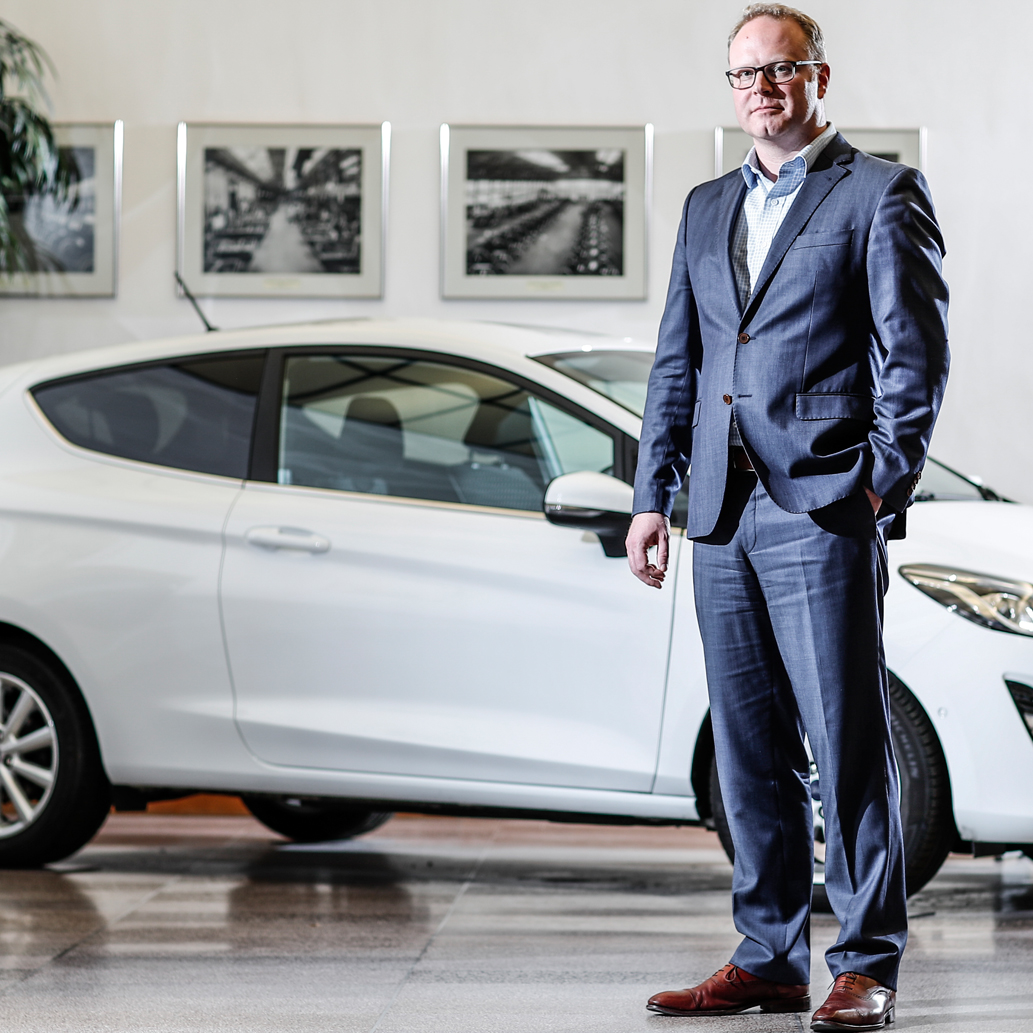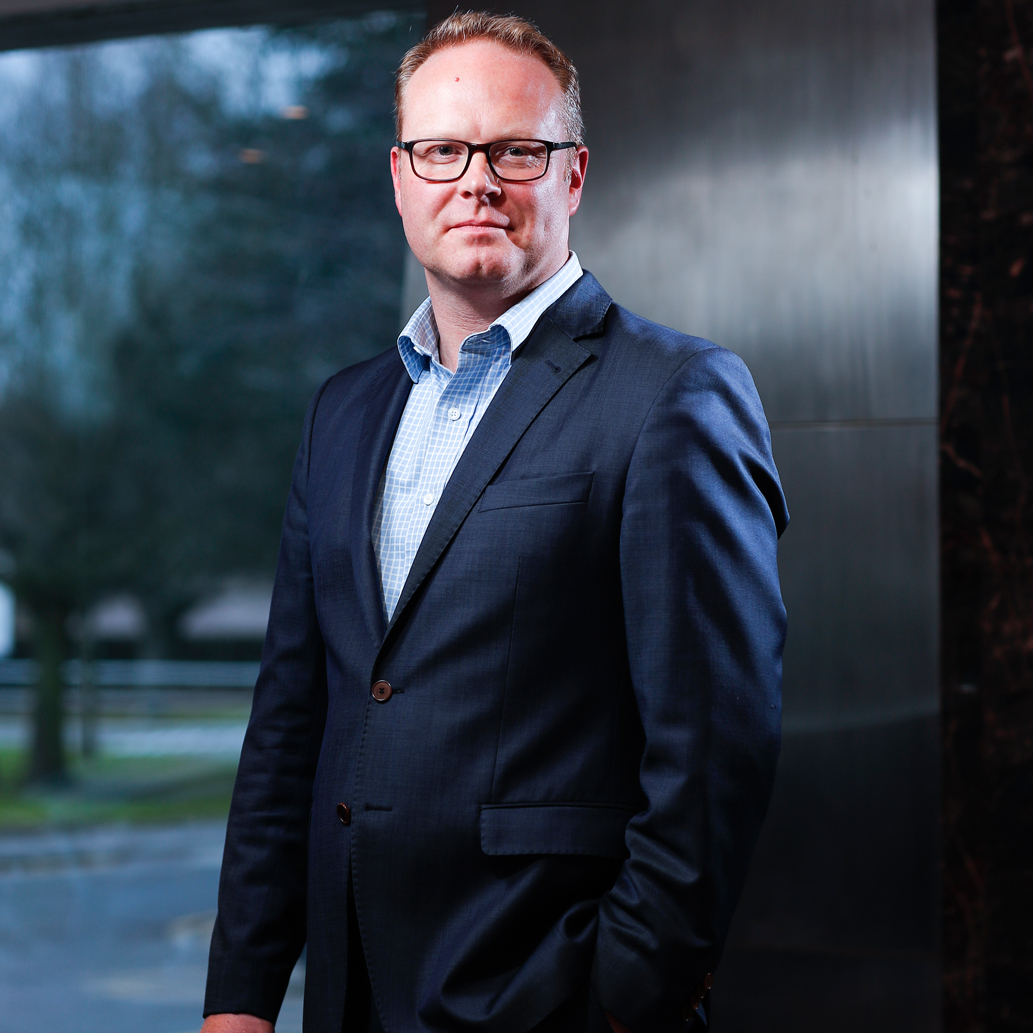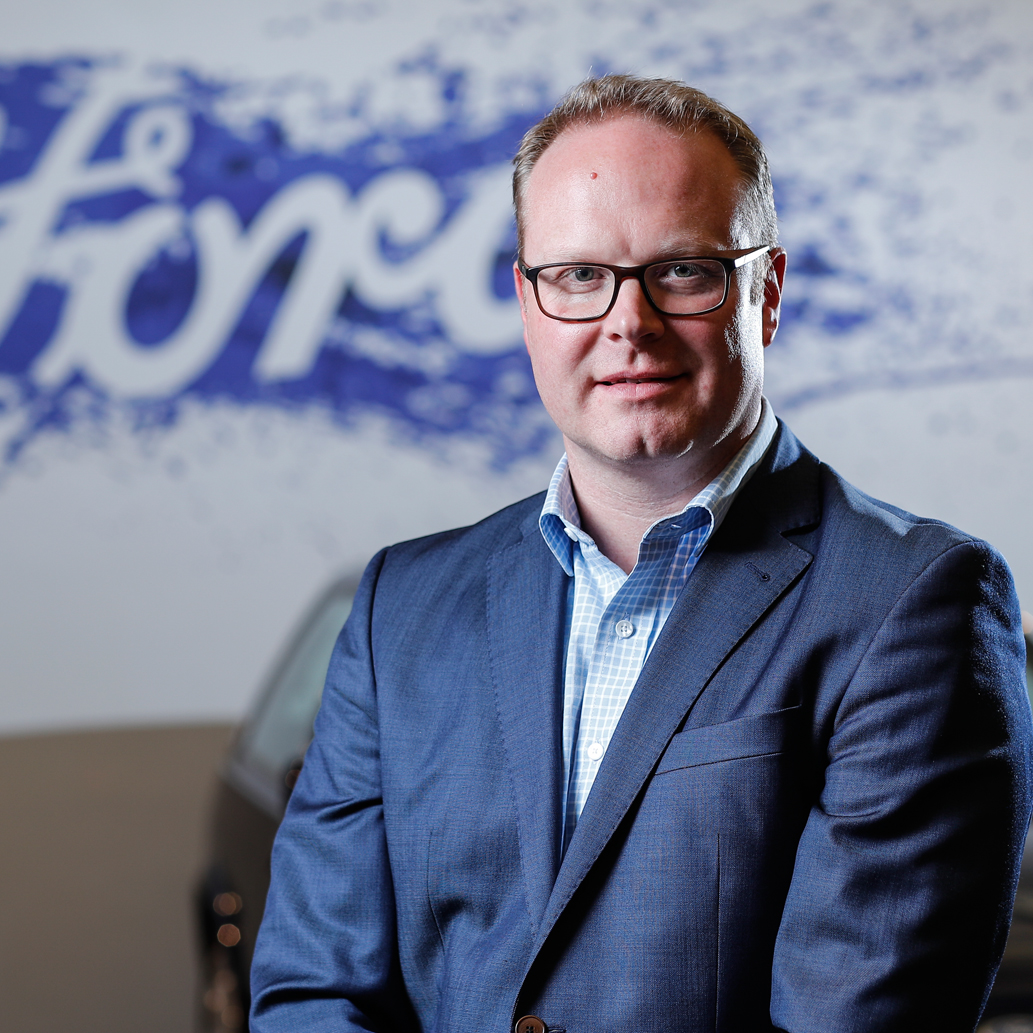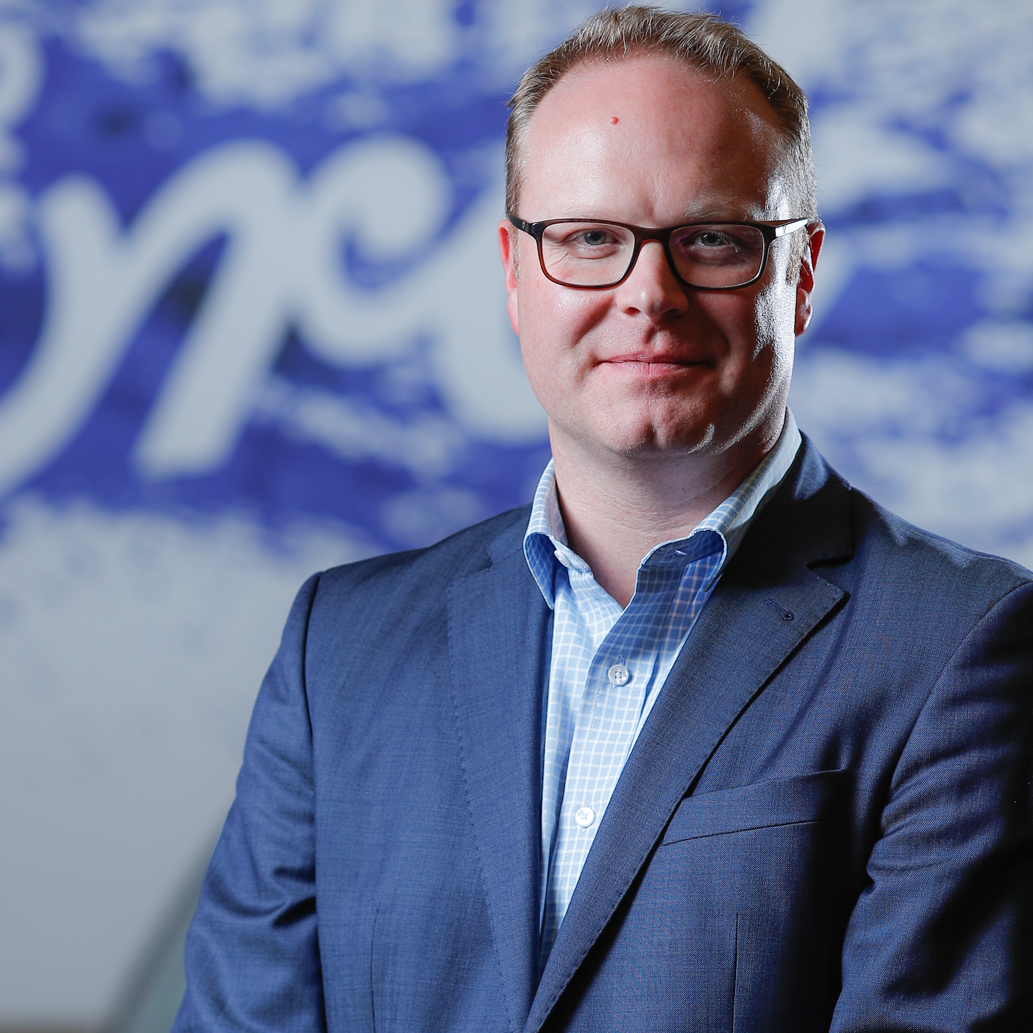Peter, tell us about your early life and how you decided on a career in HR?
I guess there must be HR in the family genes, as my father was in HR and also started out at Ford, although he moved industries when I was very young and ultimately ended up as the HR director of a large Brewing Company. Like many young people, I didn’t have a clear sense of what career to choose as I was growing up, and at university I studied biology purely because the subject interested me. When you don’t know your own mind, it can be good to take the advice of others and, of course I was influenced by my dad’s successful career, and so HR kept rising to the top of the choices. I applied to a few companies, one of them being Ford, and they made me what I thought was the best offer, mainly in terms of the range and variety of the training and activities and the company, the business and the industry has enthralled me from that day to this. Ford was very much on the front of the HR curve with a good reputation in training and development, so I couldn’t have made a better choice. It was late 1997 when I started and I initially joined on the banking side of the business, where there was a good deal of change going on, as Ford was acquiring other brands such as Land-Rover and Volvo around that time. This created some really interesting HR work and I got involved in setting up the finance operations to support dealers and customers of those brands, carrying out a lot of recruitment around Europe. That was an incredibly exciting introduction to working internationally for me and I spent two years doing that, and was then transferred to the Transit manufacturing plant in Eastleigh Hampshire. In terms of a completely different career experience, this was it, particularly as my role was shop floor employee relations where the feedback was always direct and immediate.

Such a very different role, did you wonder why you had been moved?
One of the really great things about Ford is the opportunity to expand your horizons and work in many different parts of the business. If you’re ambitious it enables you to gain lots of diverse experiences without having to change companies, but of course, you go into each new role with a good deal of naivety. You really have no idea of the complexities, but you find out pretty quickly, and I really reflect on this role as being an important developmental period for me with a big learning curve where I had to quickly build credible relationships and deal with a really wide range of issues. One of the great things about an assignment such as that is that when you walk across the factory floor and see the production line in motion, you really understand the beating heart of the business – it’s a hectic and absorbing world, but it is a great place to experience HR.

What were your main learnings here, managing against resistance, dealing with unions?
I had to learn very fast in that role and some of the key things I picked up were; the importance of planning; anticipating reactions and making sure you can justify what you say; plus having a realistic understanding of what can be done; the power of empathy and keeping calm. When you’re in the “eye of the storm”, of course; the value of relationships is paramount. Much of what HR does is about change and although it is an inevitable part of life, it is rarely welcomed. I really started to understand in that job how HR plays such an important role in managing change and how strong relationships can be a helpful enabler to this. I have seen a lot of changes during my time in the company as we have evolved and also as a result of the continuous drive for improvement. I am proud though of the way that we have managed these changes and how we have always sought to deliver change in the right way and with consideration to the impact on our people at the centre of our thinking.
My next move was out of manufacturing and into my first supervisory role, within the product development team. I was managing a team of employee relation officers at our PD centre in Essex, focussing on a mixture of HR issues such as; performance management and the ever-constant change management. As the business continued to evolve, we were adjusting the engineering programmes, growing in some areas, shrinking in others. I was gaining a real in-depth understanding of the organisation, how the different areas fitted together, and product development was fascinating. We had developed the first generation Focus and we were coming to market with models that were being very favourably received, a key indicator that we were on the right track with our technology and were world competitive. From that strong platform we were also looking to expand and diversify through mergers and acquisitions. For example, we acquired companies such as Kwik-Fit and also sought to build capability in emerging technologies like Telematics. However, this period of rapid change started to slow and around 2002 we entered a period of refocussing on the core business. What followed was a period of divestment, with an emphasis on production efficiency. It is challenging work, but an HR reality that you cannot side-step and it really started me thinking about the importance of HR in terms of influencing business structure and efficiency. By this time I had moved roles again and was now looking after the brand teams in the European business. My focus was now on marketing and sales and working towards moving this into a much more centralised, European model through organisation design and development.

When technology is the driver, trying to future predict is near impossible, but in the car market massive change is beginning to become a reality, and the speed is quite shocking.
Definitely – you have to try and forecast what will happen in the future and be aware of how the business needs to change to keep pace with the rest of the world. You have to be thinking ahead, looking at the business through multiple lenses, mindful of the competition from around the world, including emerging competitors and technology changing the way vehicles are built and operate. What just a few years ago may have seemed like a distant future is now starting to become reality. I have seen several key trends play out in our business and I think that most of those were things that we had spotted in our future planning.
Training, learning and development has been a foundation of Ford for generations and an area where the company has gained an enviable reputation. This must be even more important today, given the constant rise of technology.
Yes of course, although it can be a challenge for a business of our size and scale these days, it’s not just about developing traditional skill sets with small increments of evolving technology – we increasingly have to look outside the business, whether that be emerging technologies, advances in design and production and, of course, the changing expectations of customers and making sure that we develop or acquire the skills that are needed to enable us to be competitive across all of these areas both now and in the future. In my mind, this is an area which is going to be a critical differentiator in terms of competitiveness moving forward and it’s a big part of my focus for the EMEA business and where I invest a significant portion of my time.
With Middle East and Africa as part of your responsibilities how do you approach this emerging region in comparison to the more mature European Markets?
Ford has not always been quick to develop into new markets. For example in China our initial slowness to market meant we were playing catch up for several years to get on a competitive footing. With the Middle East and Africa, I don’t think the same can be said – we are very much in there as those markets develop. What is critical though is to ensure that we balance the investments we make to grow with the true scale of the opportunity. You can easily over-invest or under-invest in emerging markets and both of these scenarios can result in the business underperforming, so we are really trying to hit the “sweet spot” in MEA, drawing on our experience from other regions.
You haven’t always worked within the Ford brand - you spent a few years seconded to Jaguar Land Rover - what was that experience like and what did you learn there?
That’s right I was seconded to Jaguar Land Rover – which was then under the Ford umbrella from 2004-2007. I was initially based at the Jaguar Plant in Castle Bromwich, and shortly after I arrived became engaged in consolidating their two West Midlands manufacturing sites into one single site. It was a substantial change project, and the first really high profile change programme I had led, so was a significant step for me personally. Fortunately, the project went well and on the back of that I moved to a position as the lead HR Business Partner for Manufacturing and the Corporate Staffs areas, which meant I was supporting quite a number of the Company’s senior leaders. Accountability to deliver was very much at HR’s door, so a lot of my role was ensuring that things stayed connected in terms of activities that were happening across the business. During 2006 there was new corporate leadership in Ford and with increasing concerns about the financial security of the business the company went into a period of consolidation. It was around that time that I was asked to take on a role in the US, managing the global HR strategy. Despite the disruptive backdrop, I knew this was a great opportunity professionally, to build on the skills I had developed, working on a future-ready strategy in a very disrupted and uncertain new world. Of course, personally it also had an impact, and required relocating my family to Michigan. Excitedly, we boarded the plane to Detroit that would take us to our new life.
People I have interviewed whom have worked in the US say a common language is practically all we share, and that the cultural differences are massive.
I think there’s some truth in that and it definitely required some cultural adjustment on my part as I became used to working in a corporate head office environment and looking at the business from a new vantage point. To be honest though, my core focus was on evolving some of our HR processes to become more global and common, although there was a balance to strike between finding that commonality and also meeting the needs of different markets with different cultural and legislative requirements. This experience definitely helped me get familiar with the concept of wearing different hats at the same time, for example by representing my own region in discussions, but also taking a global view of the whole business. Unfortunately though, after just a year in the US, the financial crisis really began to take hold and the impact of this on the automotive sector and the US was very deep. It quickly became clear the company was on a different path and it was all about survival. Consequently, what had been intended as a longer-term assignment was cut short. It was a tough time, as we really didn’t know if the company would make it through the crisis. We returned to the UK heavy hearted, but definitely richer for the experience as a family, we readjusted pretty quickly and I was back at Dagenham, doing what I knew and loved as HR lead for all operations across what is still one of the biggest European manufacturing sites.
Despite the economy, Ford did emerge in good shape and really competitive. Yes, the European operation had been prudent and continued to invest in product and people, and we were making progress on building the brand. We were really getting traction and had a clear focus of where we were going, who our competition was and what we needed to do to win. I spent four and a half years at this stage in Dagenham and managed some significant changes, including the closure of the Stamping and Tooling plant, which was another challenging project that concluded in mid-2013. It was around that time that I was just contemplating my next move when the Company asked whether I would be interested in becoming the HR Lead for the ASEAN region. I really knew very little about Asia, but it was clear it would be fantastic development role with HR responsibility for five key markets (Thailand, Vietnam, Indonesia, Philippines, and Japan) and oversight of several other smaller markets. So we packed our bags and headed off the Bangkok, where I became the only British expat in the business leadership team. A big part of that job was having responsibility for our plants across the region – two in Thailand and one in Vietnam with a combined employee base of around 12,000 people. Consequently this meant I had to liaise with and build relationships with the labour authorities and governments in those countries which was fascinating from a cultural point of view.
Speaking of the future, after years of speculation, suddenly the era of electric vehicles and even self-driving cars has arrived. The impact on the motor industry will be huge. It not only challenges your perception of travel, but it really challenges what it is to be a manufacturer of vehicles for the last 120 years.
Absolutely, the growth of the electric vehicle market really hit home for me when we moved to Shanghai in 2016. It was apparent just how rapidly that market is growing and it became clear that as a business it was time to re-focus not only the technology driving change, but also on the logistic and social impacts. Today it feels that we are really challenging perspectives on how people will travel in the future. In fact, this was one of the core reasons my time in China was cut short as an opportunity came up, to move back to Europe and take up my current role of vice president of Human Resources Ford of Europe and Middle East and Africa in early 2017.
I think we will see more change in our industry over the next decade than we have seen the last five decades. We are spending a good deal of time, not only thinking about how we will evolve, but also about putting structures in place, looking at the potential new models that will shape our future world of travel, vehicle ownership, ride sharing, and the logistics of vehicles being charged. Whilst we will remain in the business of manufacturing cars and trucks, I suspect there is not much of what we do today that will look the same in the future. Ever since the original Model T’s rattled off the production line a century ago, our evolution has been in relatively small increments of basically the same technologies that is now changing and when you think about those changes, it’s an opportunity to think about where the value sits in the business and how best to compete. Will people own vehicles or will they just be shared? Access to fuel or charging? The ability to access and monetize data? As vehicles become more connected how can you provide new services that are of value to the customer or user? As a leadership team, we have to try to identify those opportunities and determine how the business can best capitalize on them.
Right now, you are still producing combustion engines, and so you have to align two development charts, broadly speaking.
Yes, we have to continue to produce top level, competitive vehicles but at the same time support changing and emerging technologies and transition our business model. It throws up many deep questions around timing and strategy and with it, plenty of HR work. I think certainly there will continue to be high demand for our services as we move forward and particularly in the areas of learning and development, recruitment and skill transition. It is really important that we take our people with us on those journeys and engaging the team through this transition is also going to be a key building block.
Bringing HR back to the fundamental which is people, in order to bring forth the development you have been talking about, you’re recruiting a real mindset of young people that have been brought up with technology and they will be the architects of the future.
Definitely, this is something that I find challenging and exciting in equal measure. Technology is forcing the automotive industry in a spectacularly new direction and that is attracting some people from areas who might not have previously considered our sector. It’s becoming increasingly hard to differentiate between automotive high tech and information technology because they are now intertwined throughout the product. It’s nice to be part of that change but it’s also challenging us as we have a culture that has developed over 115 years and we are now recruiting people who have different experiences, mind-sets and expectations. In many cases they want greater autonomy in their work and have different expectations of their career and employer and that’s really making us think about our culture and how we operate. It’s certainly an interesting area for us as HR to focus on and to be challenged to develop strategies to manage. When we look back on this time, I think we will see it as a period of fundamental shift in terms of how humans move about, it will go down in history as a great platform change. You don’t have to look too far to see how the digital transformation has caught out business leaders out in other industries, and so nobody can afford to be complacency. How manufacturers like Ford manage the transition will define which organisations are present in the future and which ones are only remembered in motor museums.












